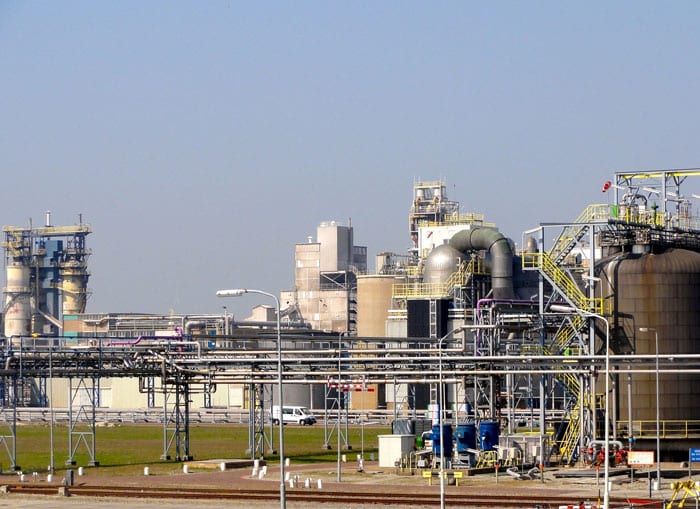
This post provides detailed information on the chemical engineer job description, including the key duties, tasks, and responsibilities they commonly perform.
It also highlights the major requirements candidates need to meet to be qualified for hiring for a chemical engineering role in most companies.
What Does A Chemical Engineer Do?
Chemical engineers use the scientific principles from math, physics, chemistry and engineering to design and upgrade processes for efficient and safe making of chemicals, drugs, food, fuel and other products.
The chemical engineering department of the University of Michigan defines the chemical engineer’s role as one that applies knowledge of chemistry, mathematics, and other natural sciences in creating cost-effective ways to utilize energy and materials for the benefit of mankind.
You can find them across a wide range of industries like pharmaceuticals, food processing, energy, environmental health, etc.
Some of the core functions in a chemical engineer’s job description include designing and developing processes for manufacturing chemicals drugs, food, fuel, and other products.
Chemical engineers are responsible for planning and testing different methods of manufacturing products.
It is also their duty to assess production operations and quality control programs.
Troubleshoot any issue plaguing manufacturing processes, as well as adhering to health, safety and environmental regulations is also part of their role.
According to Onetonline, the tasks of a chemical engineer include developing safety procedures to guide workers who operate certain equipment or who work in an environment where chemical reactions are going on.
They usually run research to create or improve existing chemical manufacturing processes and calculate production costs, energy usage, and environmental impacts.
Other duties they carry out include recommending corrective actions when faced with plant operations issues.
They guide new process adoption and usually prepare technical reports and documentation.
They are expected to work well with other chemists, engineers, technicians, and staff and recommend manufacturing equipment and measure performance.
Chemical engineers are significant when it comes to product quality, cost-effectiveness, safety and sustainability of production processes word wide.
Chemical engineers usually report to senior chemical engineers, engineering managers or production managers within the organization. The structure within the place decides.
A chemical engineer must have a Bachelor’s degree from an accredited institution. Some positions may demand someone with a Master’s degree or PhD.
Entry positions usually does not require or demand a license but many chemical engineers go the route of getting a license to work as a professional engineer and that license is issued after passing exams.
To get the PE license, an engineer is expected to graduate from an ABET-accredited program.
He/she has to pass the Fundamentals of Engineering exam. You are expected to bring relevant work experience (typically 4+ years), and finally pass the Professional Engineering exam.
In the US, if you provide a direct service to the public, then you must have PE license.
Some roles may want to see certifications like Process Safety Credentials or Six Sigma.
Generally, employers want candidates that have a grounded foundation in engineering principles, problem-solving abilities, and technical skills, and your chances go a notch higher if you add a co-op experience or internship to the mix.
Advanced degrees and certifications definitely improve your career chances.
Chemical Engineer Job Description Example/ Sample/Template
Chemical engineers are expected to perform a range of tasks such as safety protocol, development, waste management, feasibility studies, equipment commissioning, and training.
For the most part, this list demonstrates the divergent skillset and wide-ranging responsibilities of an effective chemical process engineer.
The chemical engineer job description usually consists of the following duties, tasks, and responsibilities:
- Design and develop plant equipment, operations, and processes
- Analyze and interpret data from chemical production tests
- Inspect plant operations, spot issues, and troubleshoot them
- Optimize existing manufacturing processes to improve efficiency
- Run research to discover new or improved production methods
- Come up with quality control testing procedures and protocols
- Make sure manufacturing processes and plants run in line with regulations
- Advise on equipment requirements and operating conditions for new plants
- Evaluate environmental effects of different chemicals
- Offer technical guidance to chemists, technicians, and other staff
- Calculate production costs and economic viability of new processes
- Collaborate with engineering teams on process hazard analysis studies
- Analyze process stimulation and experimental data
- Execute continuous improvement initiatives to enhance productivity
- Come up with waste management strategies for sustainable operations
- Carry out feasibility studies for adopting new processing technologies
- Troubleshoot equipment malfunctions and recommend maintenance
- Supervise commissioning and start-up of new production facilities
- Offer training to operators on proper equipment operation
- Develop safety protocols and procedures for chemical handling.
Chemical Engineer Job Description for Resume
If you are making a new resume or CV and have worked before as a chemical engineer, or are presently working in that role, then you can make a compelling Professional Experience section for your resume by applying the chemical engineer job description sample provided above.
You can express the duties and responsibilities you have carried out or are currently performing in your role as a chemical engineer in your resume’s Professional Experience by using the one provided in the above job description example.
This will show that you have been effective performing the duties of a chemical engineer, which can greatly boost your chances of being hired for the new position that you are seeking, especially if it requires someone with some chemical engineer work experience.
Chemical Engineer Requirements: Skills, Abilities, and Knowledge for Career Success
Here are sets of skills, abilities, and knowledge commonly required that candidates for a chemical engineering position should have to be hired by most employers/recruiters:
- Proficient in understanding chemical principles, process, kinetics, and reactor design
- Possess knowledge of separation techniques, heat, and mass transfer operations
- Expert at using simulation software and modeling tools
- Familiarity with industrial equipment design and operation
- Possess impressive personality problem solving prowess, critical thinking, and analytical skills
- Solid comprehension in the sciences and engineering discipline
- Exceptional communication skills to express self verbally and in writing
- Great deal of focus and attention to detail and passion for quality delivery
- Possess organizational skills necessary to handle multiple projects.
Chemical Engineer Employment
The May 2023 employment data from the U.S. Bureau of Labor Statistics shows that 21,140 chemical engineers were employed in the United States that year.
States with the highest levels of employments for chemical engineers included:
- Texas, 3,280
- California, 1,550
- Ohio, 1,220
- Massachusetts, 1,200
- Pennsylvania, 1,100
In terms of industries, chemical manufacturing (3251, 3252, 3253, and 3259 only) and architectural, engineering, and related services have the highest employments for chemical engineers, with 5,560 and 3,070 employments respectively.
Chemical Engineer Salary
According to Zippia, the average salary for a chemical engineer in the United States is $89,449 annually, with salaries typically ranging between $67,000 and $119,000 per year.
The top 5 highest paying states for chemical engineers in the United States according to data from Zippia include:
- Texas, $112,047
- New Mexico, $108,353
- Oklahoma, $101,222
- Louisiana, $100,566
- District of Columbia, $97,437.
Also, according to Zippia, industries that pay the highest salaries to chemical engineers include energy ($97,766) and technology ($97,162).
Chemical Engineer Job Satisfaction
According to survey by CareerExplorer on job or career satisfaction, most chemical engineers have indicated that they are happy with their career and job by rating 2.9 over 5 stars.
The survey centered on how they felt about the following:
- Their salaries
- Job meaningfulness
- Personality suitability
- The work environment
- Working to full potential.
Salaries: 557 chemical engineers were asked if they were happy with their salaries and they gave a rating of 3.4 over 5 stars. This means they are satisfied with their salaries, which could have contributed to the overall job satisfaction.
Job meaningfulness: When asked if they found fulfillment in their job, the 582 chemical engineers who participated in the survey gave a rating of 2.7 over 5 stars. This means some chemical engineers do not see much meaning in what they do while others do.
Personality and job suitability: 651 respondents gave a rating of 3.5 over 5 to the question on whether the personality of a chemical engineer fit their work. This is a high rating that means that the majority of chemical engineers believe their personalities very much fit their job.
Work environment: A rating of 3.2 over 5 stars was given by 650 chemical engineers who responded to the question on if chemical engineers enjoy their work environment. Also a high rating, this means that the majority of chemical engineers are happy with their place of work.
Working to full potential: When asked if their skills and abilities are maximally utilized on their job, the 650 chemical engineers who took the survey gave a rating of 3.1 over 5. This also means that the majority of chemical engineers feel they are working to full potential in their places of work as their skills and abilities are well utilized.
Conclusion
A chemical engineer is behind the design and development of manufacturing processes that help make chemicals, food, fuels, medicine, and other products possible.
They put the principles of chemistry, biology, physics, and mathematics to work in order to solve real-world problems.
Chemical engineers do their work in a variety of industries, from pharmaceuticals to energy production to food processing.
Their work is necessary for developing new products and improving existing ones, all while ensuring safety, efficiency, and environmental sustainability.
Chemical engineers also provide important services in the areas of research and development, as they work to create innovative solutions to complex challenges.
They may work in cooperation with scientists, technicians, and other engineers to design and test new materials, processes, and technologies.
Through their competencies, chemical engineers help drive progress and advance the frontiers of science and industry.
For chemical engineers, they must possess a strong foundation in chemistry, physics, and mathematics, as well as specialized knowledge in areas such as thermodynamics, fluid mechanics, and reactor design if they must be successful in this role.
They must also be good at using several software tools for data analysis, process simulation, and project management.
This post has taken a comprehensive look at what the chemical engineer do? What industries they work in, their educational qualifications, the responsibilities expected, and of course salary information.
Employers and employees can find this article useful, whether you want to create a job description that highlights the requirements that can attract the best talent to your organization or you want to know the expectation of a company from a chemical engineer candidate, everything is detailed and accurate.
Chemical Engineer Resources
Here are valuable resources you can access in developing and making a success of your chemical engineering career:
Professional Organizations:
| American Institute of Chemical Engineers, AIChE AIChE has over 60,000 members from more than 110 countries, making it the world's biggest organization for chemical engineering professionals. | Institution of Chemical Engineers, IChemE IChemE is based in the UK and was founded in 1922. It is internationally recognised qualifying body and learned society for chemical, process, and biochemical engineers. | American Chemical Society, ACS With over 200,000 members across 140 countries, ACS is definitely one of the world’s largest scientific organizations. |












